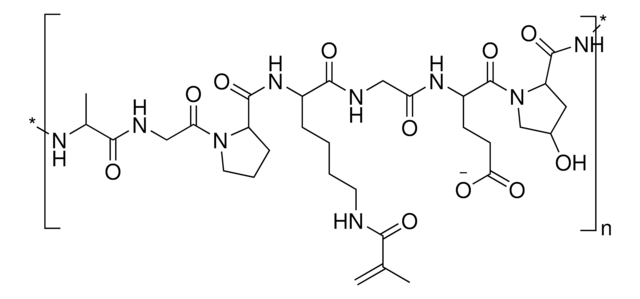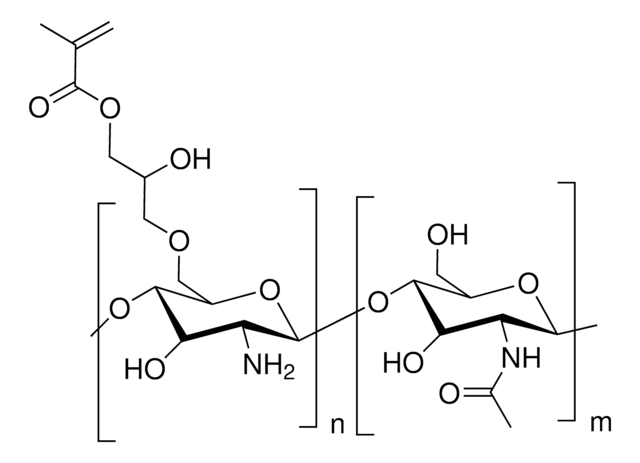938424
TissueFab® Discrete GelMA
90-110 bloom, 50% degree of substitution
Se connecterpour consulter vos tarifs contractuels et ceux de votre entreprise/organisme
About This Item
Formule linéaire :
(C32H48N9O11)n
Code UNSPSC :
51171641
Nomenclature NACRES :
NA.21
Produits recommandés
Niveau de qualité
Description
Application: 3D bioprinting, tissue engineering
Forme
powder or chunks ( or fibers)
Couleur
white to light brown
Température de stockage
−20°C
Catégories apparentées
Description générale
Gelatin methacryloyl, also known as gelatin methacrylate or GelMA, is a methacrylate-functionalized gelatin biomaterial. The gelatin amine groups are chemically modified with methacrylate groups, which when combined with light and a photoinitiator, can be be photopolymerized to form a hydrogel with a three-dimension network that closely mimices the native extracellular matrix (ECM). GelMA is often used as a scaffold for cell culture and tissue regeneration, as it provides a supportive environment for cell attachment, proliferation, and differentiation. Its properties, such as mechanical strength, degradation rate, and gelation behavior, can be adjusted by modifying the degree of methacrylation and crosslinking density.
Many GelMAs currently available have a high degree of variation and inconsistency. To address this, the TissueFab(R) Discrete GelMAs have been developed to achieve a specific degree of methacrylation with low batch to batch variability.
Many GelMAs currently available have a high degree of variation and inconsistency. To address this, the TissueFab(R) Discrete GelMAs have been developed to achieve a specific degree of methacrylation with low batch to batch variability.
Application
- Tissue engineering - including bone tissue, cartilage tissue, epidermal tissue, and cardiac tissue
- Regenerative medicine - including injectable tissue constructs and endothelial cell morphogenesis
- Drug and cell delivery - in the form of microspheres and hydrogels
- Surface coatings - of medical devices and implants in order to improve biocompatibility and release therapeutic cargos
Caractéristiques et avantages
- Specific degree of methacrylation - a narrow peak of methacrylation allows for better reproducibility, low batch to batch variability, for improved consistency of gel properties and cell behavior.
- Biocompatibility - GelMA contains RGD sequences, found in collagen and other natural ECM proteins, which promote cell adhesion, proliferation, differentiation, and maturation of a variety of cell types.
- Biodegradability - GelMA contains matrix metalloproteinase (MMP) degradable sites that can be recognized and enzymatically degraded by cells. This allows the encapsulated cells to degrade and remodel the GelMA matrix, and repopulate with their own cells and tissues, a major goal for tissue engineering and regenerative medicine.
- Tunability - The TissueFab(R) Discrete GelMAs are available in a variety of degrees of substitution which ultimately impact the hydrogel stiffness and mechanical properties and can be used to recapitulate and accomodate different native tissues.
- Bioprintability - The TissueFab(R) Discrete GelMAs are widely used in the field of 3D bioprinting due to their unique gelation properties and the ability to print via extrusion and other methods to create intricate cell-encapsulated 3D structures with high cell viability.
Informations légales
TISSUEFAB is a registered trademark of Merck KGaA, Darmstadt, Germany
Produit(s) apparenté(s)
Réf. du produit
Description
Tarif
Code de la classe de stockage
11 - Combustible Solids
Classe de danger pour l'eau (WGK)
WGK 3
Point d'éclair (°F)
Not applicable
Point d'éclair (°C)
Not applicable
Certificats d'analyse (COA)
Recherchez un Certificats d'analyse (COA) en saisissant le numéro de lot du produit. Les numéros de lot figurent sur l'étiquette du produit après les mots "Lot" ou "Batch".
Déjà en possession de ce produit ?
Retrouvez la documentation relative aux produits que vous avez récemment achetés dans la Bibliothèque de documents.
Photocrosslinkable gelatin hydrogel for epidermal tissue engineering.
Zhao X, et al.
Advanced Helathcare Materials, 12 (2015)
Direct-write bioprinting of cell-laden methacrylated gelatin hydrogels.
Bertassoni LE, Cardoso JC, Manoharan V, et al.
Biofabrication, 6(2), 024105-024105 (2014)
Mineralized gelatin methacrylate-based matrices induce osteogenic differentiation of human induced pluripotent stem cells.
Kang H, Shih YR, Hwang Y, et al.
Acta Biomaterialia, 10(12), 4961-4970 (2014)
Cell-laden microengineered gelatin methacrylate hydrogels.
Nichol JW, Koshy ST, Bae H, et al.
Biomaterials, 31(21), 5536-5544 (2010)
The 3D printing of gelatin methacrylamide cell-laden tissue-engineered constructs with high cell viability.
Billiet T, Gevaert E, De Schryver T, et al.
Biomaterials, 35(1, 49-62 (2014)
Notre équipe de scientifiques dispose d'une expérience dans tous les secteurs de la recherche, notamment en sciences de la vie, science des matériaux, synthèse chimique, chromatographie, analyse et dans de nombreux autres domaines..
Contacter notre Service technique







